PA students develop confidence by using willed bodies for training
- February 22, 2024
- By: Eric Griffey
- Community
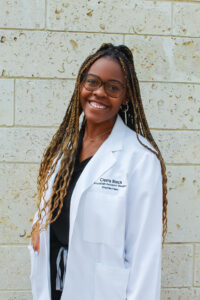
Cierra Black chose to attend The University of North Texas Health Science Center at Fort Worth in part because she wanted the experience of working with willed bodies.
Practicing skills on human tissue allows students to gain firsthand experience in manipulating and dissecting human tissues, closely mirroring what they will encounter in clinical practice. The dissection allows students to explore the three-dimensional nature of human anatomy, which can be challenging to grasp through two-dimensional images or virtual simulations.
Black, a second-year Physician Assistant Studies student, just began her clinical rotation at John Peter Smith’s Center for Women. She said working in HSC’s bioskills lab has given her an advantage over other students whose programs do not offer the same hands-on training.
“I looked at a lot of PA programs and that was a really big thing for me in terms of coming to a school and investing my time and energy,” she said. “I wanted to be able to study real tissue and not necessarily VR simulated bodies.”
HSC’s PA Studies program recently conducted a clinic using the donated tissue and worked on a range of procedures, including advanced suturing techniques, surgical stapling, and applying regional nerve blocks.
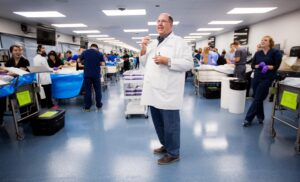
PA Tamara Willmoth, assistant professor in the School of Health Profession’s PA program, led the students.
“These labs allow our students to develop confidence and proficiency in different hands-on procedures prior to entering clinical rotations,” she said. “It is my goal that they can perform these skills on real patients during their first week in clinic because they already had the opportunity to practice on willed bodies the week prior. Because of this gift from donors, our students can practice skills that are vital in creating, not only competent but incredible providers that the HSC PA program has a reputation for cultivating.”
In Willmoth’s lab, students experience the variability in each willed body. Understanding that all bodies are unique is critically important in medical practice. This firsthand experience prepares students for the diversity of patients they will encounter.
HSC’s bioskills lab fosters the development of other skills, including teamwork, communication and professionalism. Students commonly work in small groups, promoting collaboration and communication as they dissect and learn from one another.
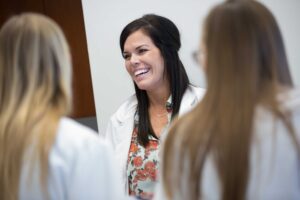
“Clinical training in the HSC’s bioskills lab allows students to learn real-life skills at a level as near to the clinical setting as you can get,” said Dr. Rustin Reeves, director of HSC’s Center for Anatomical Sciences and a professor in the School of Biomedical Sciences. “Our PA classes spent two days learning how to perform advanced suturing techniques, something they will be able to take with them when they leave here and immediately utilize from day one in their practice. The confidence they have gained will serve them and their patients well.”
HSC students have 24-hour access to the bioskills lab to study during their anatomy courses, and the staff hosts clinics on multiple Sundays throughout the year. This allows students to stay sharp if their clinical rotation sites don’t require them to use some of the skills they’ve learned.
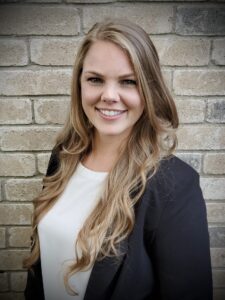
Second-year PA student Cheyenne Goucher said she had been looking forward to Willmoth’s lab. She left feeling as though she could perform many of the procedures the group practiced.
“This is a great thing for students to do,” she said. “This is the best environment for making mistakes and learning to do better.”
“I had been working on a specific suture, the deep dermal, but could not keep the knots tight enough,” she said. “After several attempts, I had finally placed some good sutures and started to close the wound with subcuticular — another stitch that required a lot of practice. I was really proud of how the laceration was looking, but my needle bent halfway through, and I was unable to finish. I will definitely be taking advantage of upcoming open lab days to improve my skill in closing deep wounds.”
Even with the introduction of elaborate 3-D visualization software, dissection remains a cornerstone of a medical education for most students, as it has for centuries. Students spend months methodically studying the structures of the body, including organs, muscles, nerves, vessels and other tissue. The experience teaches more than the foundations of medicine. Treating the donor, who is viewed as a doctor’s first patient, with respect and care gives students a grounding in ethics and professionalism.
The tissue used by the students were donated to the Center for Anatomical Sciences through HSC’s Willed Body program and is governed by the rules of The Texas State Anatomical Board. To donate your body to help future health care providers, follow this link.
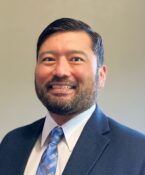
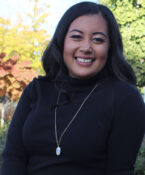
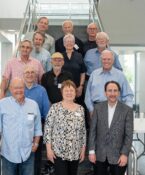
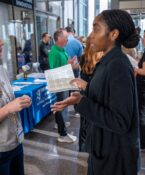

Social media